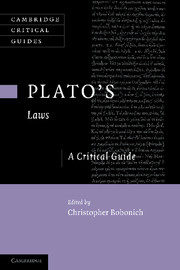Book contents
- Frontmatter
- Contents
- List of contributors
- Introduction
- 1 The Laws' two projects
- 2 The relationship of the Laws to other dialogues: A proposal
- 3 Ordinary virtue from the Phaedo to the Laws
- 4 Virtue and law in Plato
- 5 Morality as law and morality in the Laws
- 6 Puppets on strings: Moral psychology in Laws Books 1 and 2
- 7 Psychology and the inculcation of virtue in Plato's Laws
- 8 Images of irrationality
- 9 Family and the question of women in the Laws
- 10 The theology of the Laws
- 11 Plato's ‘truest tragedy’: Laws Book 7, 817a–d
- Bibliography
- Index
5 - Morality as law and morality in the Laws
Published online by Cambridge University Press: 06 December 2010
- Frontmatter
- Contents
- List of contributors
- Introduction
- 1 The Laws' two projects
- 2 The relationship of the Laws to other dialogues: A proposal
- 3 Ordinary virtue from the Phaedo to the Laws
- 4 Virtue and law in Plato
- 5 Morality as law and morality in the Laws
- 6 Puppets on strings: Moral psychology in Laws Books 1 and 2
- 7 Psychology and the inculcation of virtue in Plato's Laws
- 8 Images of irrationality
- 9 Family and the question of women in the Laws
- 10 The theology of the Laws
- 11 Plato's ‘truest tragedy’: Laws Book 7, 817a–d
- Bibliography
- Index
Summary
THE LAW WITHIN
Kant is well known for his admiration both of the starry heavens above and of the moral law within. He is not the first to believe that morality should be understood as internal law. Butler expresses the same view in his claim that human beings are ‘a law to themselves’. Butler quotes this phrase from St Paul, and in doing so he connects his view with the conception of natural law that Patristic and medieval writers derive from St Paul. This conception is not purely Christian. Lactantius endorses the conception of natural law that he quotes from Cicero's De Re Publica, and so he allies himself with Stoic views.
How is Plato connected with this belief in morality as internal law? The author of the Epinomis (986c) agrees with Kant's view that the starry heavens above are an appropriate object of admiration. He finds there the embodiment of cosmic order and reason. The Laws has quite a lot to say about law and morality, but does it treat morality as internal natural law? If it does, we may take Plato to be part of a natural law tradition. If it does not, we may regard Plato as an ancestor of this tradition, but not as a part of it.
This statement of our main question is not definite enough to allow a clear answer. We need to clarify claims about an internal natural law. (1) What does it mean to speak of morality as law?
- Type
- Chapter
- Information
- Plato's 'Laws'A Critical Guide, pp. 92 - 107Publisher: Cambridge University PressPrint publication year: 2010
- 2
- Cited by

